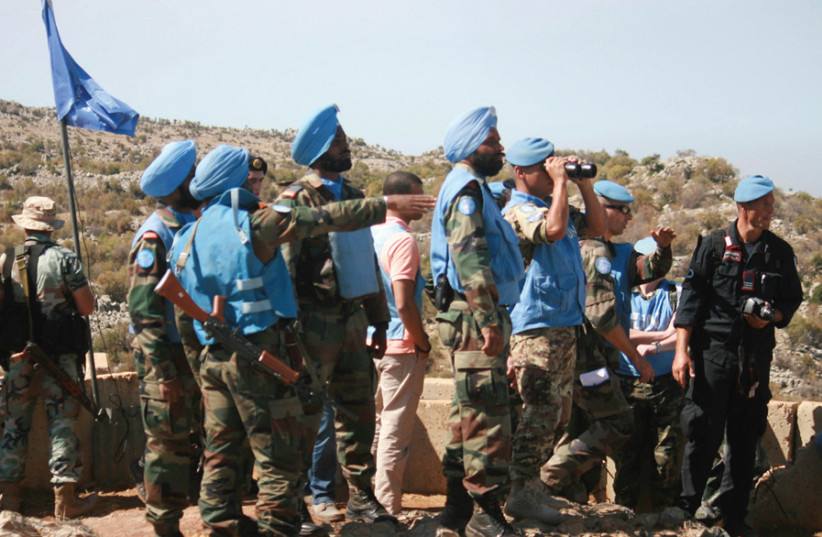Hezbollah must stop amassing weapons on Israel’s northern border, the US’s Deputy Ambassador to the United Nations, Richard Mills, told the UN Security Council in New York on Wednesday, after it voted to renew the mandate of the organization’s peacekeepers in southern Lebanon.
“The US shares this council’s significant concern about the state of affairs in southern Lebanon, in particular, Hezbollah’s threatening activities,” he said.
Tensions continue surrounding Lebanon-Israel maritime border demarcation talks
The UNSC vote comes as tension has increased between Israel and Lebanon over their maritime dispute.
On Wednesday, Reuters posted a video of two Lebanese ministers symbolically throwing rocks towards Israel.
Since 1978, the UN has maintained a peacekeeping force along the border between the two countries known as the UN Interim Force in Lebanon (UNIFIL). Since 2006 it has been specifically tasked with maintaining the cease-fire agreement that ended the Second Lebanon War and that was codified in UNSC Resolution 1701.

UNIFIL currently has a force of 10,500 peacekeepers from 48 UN countries. Its patrols focus on the area between the Blue Line and the Litani River, with an eye to preventing another arms build-up that could lead to another war, particularly by a non-state actor such as Hezbollah.
Israel holds that Hezbollah is an Iranian proxy group.
UN reiterates Lebanese Army should be only armed force in country
The UNIFIL resolution approved Wednesday reiterated the UN position that the Lebanese Army should be the only armed force in the country. It also called for UNIFIL to be given the freedom of movement needed to fulfill its mandate.
Mills said the resolution “reaffirms UNIFIL’s authority to operate independently and to conduct both announced and unannounced patrols.”
“We urge the Lebanese authorities as the host state to facilitate UNIFIL’s full and timely access to UNIFIL’s entire area of operations,” Mills said.
He echoed a concern raised many times by Israel about the Lebanese failure to ensure that UNIFIL has freedom of movement in its area of operation.
“UNIFIL peacekeepers are blocked with increasing frequency from conducting their mandated tasks and accessing sites of concern,” Mills said.
The area of between the Blue Line – the internationally recognized border that has yet to be ratified by both countries – and the Litani River “must be free of weapons except for those used by the government of Lebanon and UNIFIL,” he added.
“With this resolution [renewing UNIFIL’s mandate] the security council has made clear that Hezbollah’s continued amassing of weapons must stop,” Mills said.
He took particular issue with the actions of a non-governmental environment group called “Green Without Borders” believed to be an affiliate of Hezbollah that operates in southern Lebanon.
US accuses Hezbollah of obstructing UNIFIL
Mills accused the group of obstructing UNIFIL’s actions by placing containers near the border with Israel.
“The proliferation of prefabricated containers placed by Green Without Borders obstructs UNFIL’s access to the Blue Line and is heightening tension in the area, further demonstrating that this so-called environmental group is acting on Hezbollah’s behalf,” Mills said.
UNIFIL must also have access to the tunnels, he said, referring to the sites where Israel has documented that Hezbollah has dug attack tunnels along the border.
The UNSC votes annually to renew UNIFIL’s mandate. This year it added a paragraph to the renewal resolution that is largely the same from year-to-year, to strengthen the language showing its opposition to Hezbollah’s armed presence on Israel’s northern border and to the continued transfer of arms to that group.
The new paragraph stated that the UNSC “condemns the continued maintenance of arms outside the control of the Lebanese State by armed groups in violation of resolution 1701 (2006).”
It “recalls paragraph 15 of resolution 1701 (2006) according to which all States shall take the necessary measures to prevent, by their nationals or from their territories or using flag vessels or aircraft, the sale or supply of arms and related materiel to any entity or individual in Lebanon other than those authorized by the Government of Lebanon or UNIFIL.”
